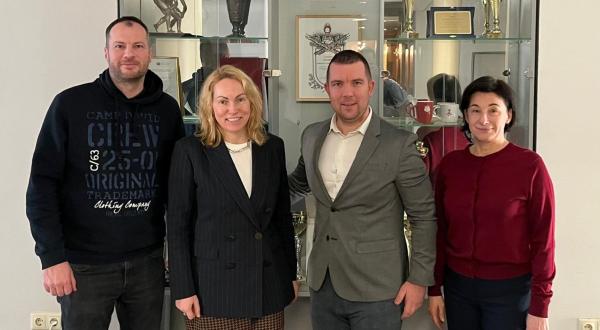Toms Baumanis, Vice-Rector for Administration and Development: Can Universities Develop?
Universities in Latvia are able to grow despite a low level of public support and regardless of their accountability to superior authorities. They can achieve their goals if they get the opportunity to take action. A notable example is Rīga Stradiņš University (RSU) that has been able to grow despite relatively small support from European Union (EU) funds and its accountability to the Ministry of Health. The number of students has tripled over the past ten years, and the number of international students has reached 25%. The budget has doubled to over €53m, and their own revenue has reached €30m. Public funding is being cut back and currently makes up less than half of the university’s budget.
In this context, the rumours that have arisen about transferring all universities to be under the supervision of the Ministry of Education and Science are politically rather than economically motivated. The Ministry of Education and Science is campaigning for a long-term solution to universities’ international competitiveness, but serious decisions need to be weighed at a government level with a financial and economic evaluation. For example, the success of universities in using EU funds to increase their competitiveness should be assessed. The EU European Regional Development Fund (ERDF), and other funds, have been invested in higher education for the implementation of many educational and science projects. Since it is taxpayer money we need to look at the return on previous investments before the next EU funding period.
RSU is able to provide taxpayers with an account of the return on the EU funds they have attracted. Between 2012 and 2018, each euro of the EU ERDF investment into the fixed assets of RSU will generate €11.4m in additional revenue now and in the future. €18m of EU funding was invested in the university, but today its value has risen to €21.8m. The achieved and expected future returns of EU fund financing is €249m. A detailed analysis of other universities returns on public funding, or other forms of public investment, is therefore needed. An evaluation of previous investments is required before the National Development Plan (NDP) for 2021-2027 is approved by the government, or the Saeima, and a decision is made on the distribution of future EU funding in higher education and science. Unfortunately, Latvia will not reach the average EU income level by politically distributing the funds.
In order for institutions of higher education to be competitive, it is necessary to talk about changing the financing model by introducing a system of state-guaranteed student loans or a “money follows the student” principle. Much more should be said about financing higher education in the new NDP than has been to date. Moreover, there is nowadays no longer any justification for dividing study programmes into academic and professional, as most programs are practically oriented. Such changes would bring study programmes closer to the education labour market and help the national economy by promoting the orientation of education towards economic growth.
The NDP should further emphasise the mandatory inclusion of digital skills in the curriculum of every study programme. The Digital Europe Programme 2021-2027 provides €9.2bn to be spent on developing digital skills. EU funds can also be used to implement digital skills in the curriculum of study programmes.
Failure to do so in Latvia will result in graduates of various specialisations, not just IT professionals, being poorly prepared for the challenges of technology and data processing and use. It is also quite difficult to find a place for additional digital skills in medical programmes at RSU because of inertia and tradition. Latvia risks falling behind global leaders, such as the United States or Finland, in the use of big data and technology unless digital skills are a requirement to obtaining a higher education across all study programmes, regardless of specialty.
The second thing to consider is the export of higher education, which is an internationally recognised indicator of economic growth. RSU, together with other large universities in Latvia, is able to explain the contribution of education export to the national economy. RSU is the Baltic leader in exporting higher education. The contribution of international students at RSU to the Latvian economy, according to a very conservative estimate, amounts to €846m between 2014 and 2024 (this is the result of a combination of past and projected benefits1). In 2019, the average direct expenditure of one full-time RSU international student in Latvia amounted to €20,000, consisting of the tuition fee (at least €11,000) and living expenses (at least €9,000).
A 2016 study by the think-tank Certus mentions that between 2015 and 2016, the value of higher education exports alone reached 0.61% of Latvia’s GDP. I hope the Ministry of Economics will explain more about the role of higher education exports to GDP growth. Higher education could, perhaps, develop much faster and more successfully under the supervision of the Ministry of Economics than it has so far.
Each university’s growth is also ensured by developing research. The country’s unequal approach to the distribution of funding for science is still troublesome as it neglects applied research that addresses current societal challenges: in the field of health, for example, it is maternal and child health, oncology, mental health, etc. Currently, the government-approved plan foresees the largest amount of funding – more than €4.5m in 2020 and €9.5m by 2022 – to be allocated to membership in the European Space Agency (ESA) and the European Organization for Nuclear Research (CERN). This represents two thirds of the amount allocated in 2020. In total, participating in ESA activities will cost Latvia €7.3m over this three-year period. We believe that, in the context of limited funding for science (seeing that we are in second-to-last place in terms of research and development investment in the EU), funding must be focused on the aforementioned priorities. This is the only way we can hope for growth in higher education, science, and the country as a whole.
For RSU international competitiveness, inclusion in top 500 rankings, or achieving other goals are not tied to the university’s accountability, but rather to the efficient use and management of resources. The place of RSU in the Latvian healthcare system is undisputed. Since the Rīga Medical Institute was established, the university has been an important hub for the education of healthcare professionals. From 1991 to 2019, almost 16,000 health care professionals have graduated from RSU, including 5,619 Latvian and 1,043 international physicians, as well as more than 5,000 social studies graduates. The contribution of RSU to the Latvian economy, higher education, and the healthcare system is undeniable if we are able to see it and evaluate it economically.
1A conservative multiplier of 1.48, as defined in a study on the contribution of education to economics published by Stellenbosch University in 2010, is used to assess indirect benefits. The OECD uses several indicators that add up to a more optimistic multiplier of 2.03. .
Related news
 RSU LASE and the Latvian Cycling Federation develop new cooperation opportunitiesDevelopment, Sports
RSU LASE and the Latvian Cycling Federation develop new cooperation opportunitiesDevelopment, Sports



